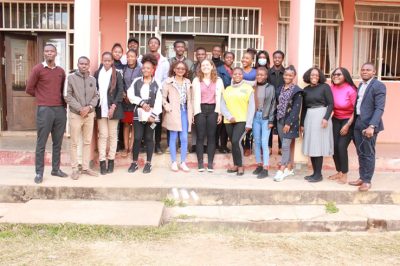The Scaling Up Nutrition Learning & Evaluation (SUN LE) program, funded by the United States Agency for International Development (USAID), through the University of North Carolina at Chapel Hill (UNC) and the University of Zambia (UNZA), has created an evidence map. of nutritional research carried out in Zambia.
An evidence map is an interactive tool that provides a visual summary of existing evidence. Evidence maps can help policy makers and program implementers make evidence-based decisions by providing a simple way to review existing data. They can also be used to help avoid duplication of research efforts and direct research resources where they are most needed. uUsing evidence to inform nutrition policies and programs can improve nutrition outcomes.
SUN LE conducted a systematic scoping review of research and literature to develop the nutrition evidence gap map in Zambia. Seven teachers, librarians, and UNC students and a SUN LE consortium member worked alongside 13 UNZA faculty and graduate students to develop the evidence map.
“The whole process of working together to facilitate informed judgment and evidence-based decision-making in development policies and practices has been a great experience.,said Tulani Francis L. Matenga, MPH, researcher at the Center for Infectious Disease Research in Zambia (CIDRZ)/University of Zambia, School of Public Health-Department of Health Promotion and Education.
The team searched four bibliographic databases (PubMed, Global Index Medicus, Global Health, and Scopus), reviewed more than 2,500 abstracts, and identified more than 500 articles and reports describing nutrition-specific or nutrition-sensitive research in Zambia. UNC provided training to the UNZA team on systematic reviews, evidence gap maps, Covidence online software and hosted webinars on data visualization and Tableau software for the NFNC and other nutrition stakeholders in Zambia.

Photo of Mia Haller MPH ’23 and Gillings Zambia Hub Fellow with the UNZA team in 2022.
SUN LE has created an evidence map that visually summarizes the categories of nutrition research being conducted in Zambia. The most common type of research is observational studies examining factors influencing infant growth, nutritional status, and feeding practices. Although less common, intervention studies have been conducted on the impact of interventions aimed at improving dietary practices and nutritional status. The Evidence Map provides a simple way to view all nutrition research conducted in Zambia by nutrition topic, allowing users to quickly identify relevant research and areas requiring more research.
The lack of evidence was recently endorsed by USAID and published on the National Food and Nutrition Commission website, where it is accessible to the public. Professionals working in nutrition and related fields – health, agriculture, water and sanitation, social protection, education, fisheries and livestock – among others, will be able to access it to find and use existing data to make decisions. Additionally, evidence mapping will help direct research resources where they are most needed. Trained local experts will continue to develop similar tools at their respective institutions and are willing to mentor and provide mentoring to others interested in developing similar tools.
